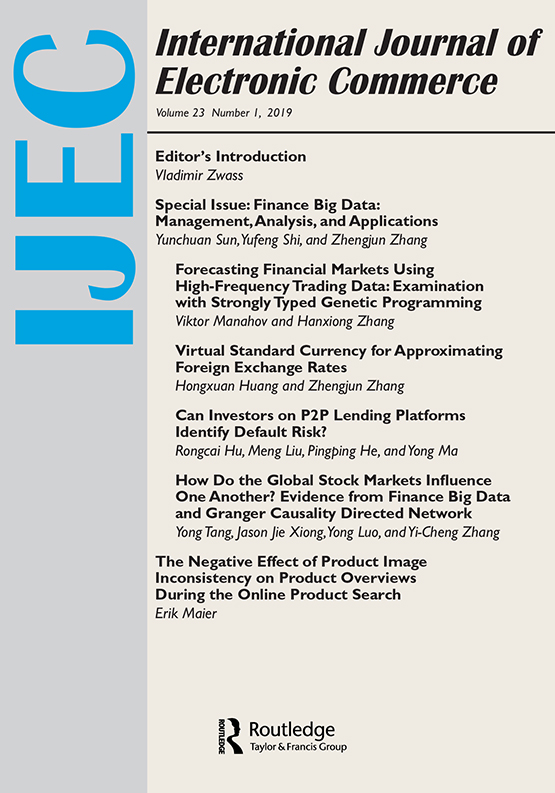Special Issue: Dark Sides of Digitalization
IF 3.8
3区 管理学
Q2 BUSINESS
International Journal of Electronic Commerce
Pub Date : 2021-04-03
DOI:10.1080/10864415.2021.1887694
引用次数: 12
Abstract
The digitalization of individuals (i.e., the proliferation of digital technologies in the lives of individual users), organizations (i.e., digitalization of work and the business environment), and societies (i.e., the digital economy) has been enabled by digital technologies such as smartphones, social media, cloud-based systems, robots, and artificial intelligence. The adoption and use of these technologies have increasingly reshaped human’s perceptions, actions, and environments and have been associated with a myriad of benefits for individuals, organizations, and societies (e.g., connectivity, enhanced decision-making, increased productivity, and economic growth) [6, 8, 17]. Despite the conspicuous benefits, digitalization has been a revolution. Different from prior revolutions, such as the industrial revolution, or revolution in transportation (e.g., as manifested in changes in speeds of trains and cars), it has been aggressive, fast moving and status quo shattering. Just over the last 40 years, personal computers have increased in storage volume and processing speeds by huge magnitudes. Like other revolutions, though, the rise of digital technologies has started revealing a number of “dark sides” with grave impacts at the individual, organizational, and societal levels [53]. While the bright sides of digitalization have received considerable scholarly attention, the literature on the dark sides of digitalization is in its early stages and in need of further research [48]. This special issue sought to add to the bodies of work that gradually mitigate this gap. At the individual level, the research on the dark side of digitalization engages with investigating its negative consequences and the side effects of using utilitarian and hedonic information technology (IT) artifacts for individual users. It acknowledges the existence of “bright sides” of IT but still strives to understand and find ways to mitigate negative, or “dark side” effects of IT on individuals, firms, and societies. So far, notable findings in this area have shed light on technology addiction [34, 46], problematic use of IT [46], technostress [4, 41, 42], general stress [45, 54], experience of ambivalence [33], negative health outcomes [40], security and privacy concerns [12, 14], online deviant behaviors such as cyberbullying [22, 23, 56], and the dark side of user-generated content [20, 32]. Adverse effects of digitalization of individuals can impact everyone, from children [11] and youth特刊:数字化的黑暗面
智能手机、社交媒体、基于云的系统、机器人和人工智能等数字技术推动了个人(即数字技术在个人用户生活中的扩散)、组织(即工作和商业环境的数字化)和社会(即数字经济)的数字化。这些技术的采用和使用越来越多地重塑了人类的感知、行动和环境,并为个人、组织和社会带来了无数好处(例如,连通性、增强决策、提高生产力和经济增长)[6,8,17]。尽管有明显的好处,数字化已经成为一场革命。与之前的革命不同,如工业革命或运输革命(例如,表现为火车和汽车速度的变化),它具有侵略性、快速发展和打破现状的特点。就在过去的40年里,个人电脑的存储量和处理速度都有了巨大的增长。然而,与其他革命一样,数字技术的兴起已经开始揭示出一些“黑暗面”,对个人、组织和社会层面产生了严重影响[53]。虽然数字化的光明面受到了相当多的学术关注,但关于数字化黑暗面的文献仍处于早期阶段,需要进一步研究[48]。这一特刊力求增加逐渐缩小这一差距的工作。在个人层面,对数字化黑暗面的研究致力于调查其负面后果,以及为个人用户使用功利和享乐信息技术(IT)工件的副作用。它承认信息技术存在“光明面”,但仍努力理解并找到减轻信息技术对个人、公司和社会的负面或“黑暗面”影响的方法。到目前为止,该领域的显著发现揭示了技术成瘾[34,46]、信息技术使用问题[46]、技术压力[4,41,42]、一般压力[45,54]、矛盾心理体验[33]、负面健康结果[40]、安全和隐私问题[12,14]、网络欺凌等网络越轨行为[22,23,56]以及用户生成内容的黑暗面[20,32]。个人数字化的不利影响可能影响到每个人,从儿童[11]到青年
本文章由计算机程序翻译,如有差异,请以英文原文为准。
求助全文
约1分钟内获得全文
求助全文
来源期刊

International Journal of Electronic Commerce
工程技术-计算机:软件工程
CiteScore
7.20
自引率
16.00%
发文量
18
审稿时长
>12 weeks
期刊介绍:
The International Journal of Electronic Commerce is the leading refereed quarterly devoted to advancing the understanding and practice of electronic commerce. It serves the needs of researchers as well as practitioners and executives involved in electronic commerce. The Journal aims to offer an integrated view of the field by presenting approaches of multiple disciplines.
Electronic commerce is the sharing of business information, maintaining business relationships, and conducting business transactions by digital means over telecommunications networks. The Journal accepts empirical and interpretive submissions that make a significant novel contribution to this field.
 求助内容:
求助内容: 应助结果提醒方式:
应助结果提醒方式:


